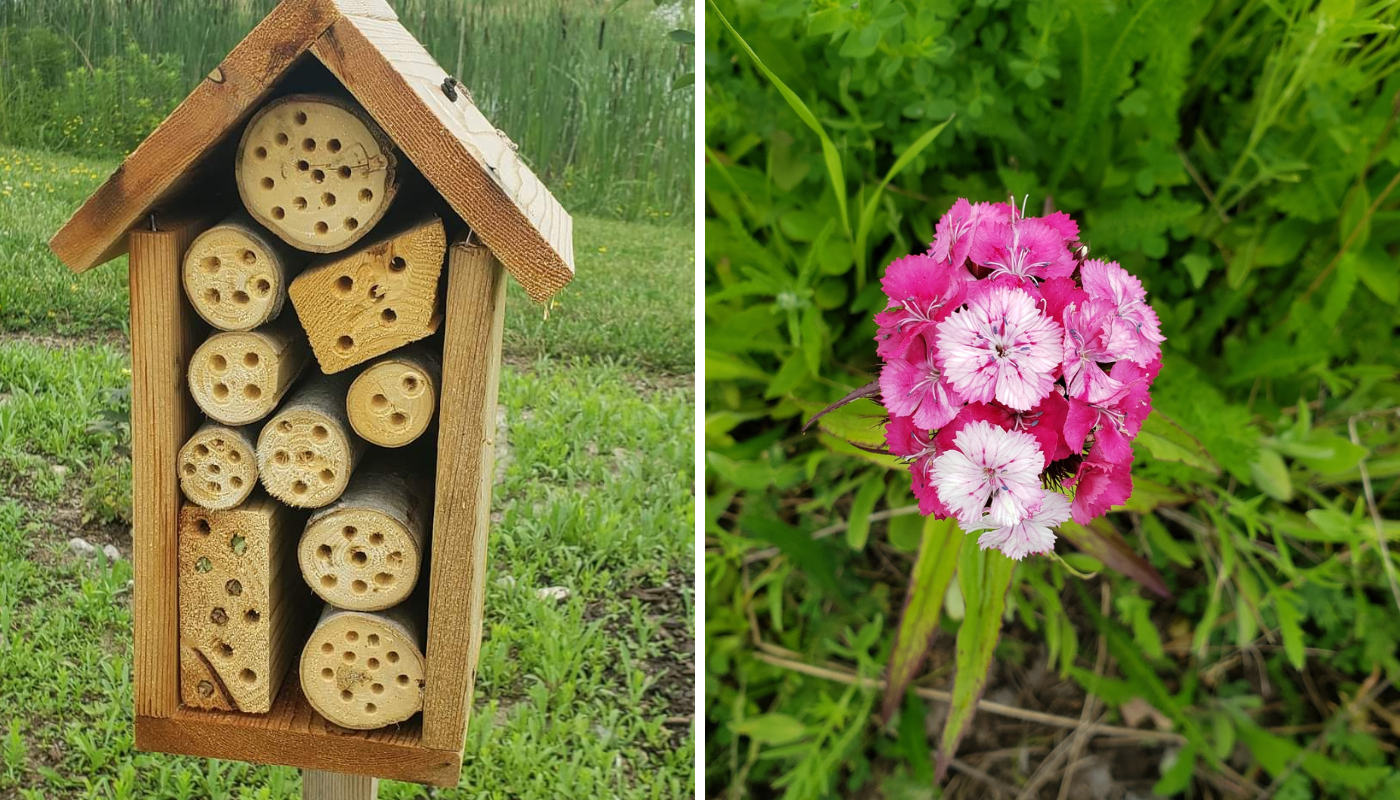
What is a pollinator?
A pollinator is anything that transports pollen grains from one flower to another. This includes bees, birds, bats, butterflies, moths, flies, wasps and beetles. Other animals, even people, can also act as indirect pollinators if they brush up against pollen and transport it to another flower. When a pollen grain moves from the anther (male part) of a flower to the stigma (female part), pollination happens. This is the first step in a process that produces seeds, fruits and the next generation of plants. This can happen through self-pollination, wind and water pollination, or through the work of animals or insects.
Georgina’s pollinator initiatives
The Town is committed to being a leader in pollinator conservation and with the community’s support, it can ensure a thriving environment for both pollinators and people. Join the Town in its efforts to protect and celebrate these essential creatures that contribute so much to the world.
- Create pollinator habitats.
Pollinator gardens have been created to help our pollinators thrive. You can take a look at some pollinator gardens in the following locations:- The ROC 26557 Civic Centre Rd., Keswick
- The Link 20849 Dalton Rd., Sutton
- Pefferlaw Library 76 Pete’s Lane, Pefferlaw
- Join the Town of Georgina’s pollinator program and be included on the map below
Town pollinator program and map
The Town of Georgina, in partnership with the Junior Optimist Club of Keswick, has provided packets of seeds for pollinator-friendly plants. Share a photo and get your garden added to the Pollinator Map. Check out the map to see where residents and the Town are working to support pollinators.
Notes about the map
Due to the mapping process, an address is necessary. If preferred, a more general area can be provided such as a cross street. Email your photo and the cross street to gis@georgina.ca. Make sure you note that the information is to be added to the pollinator map.
Addresses will not be listed on the map, see the Town’s privacy statement for more information.
Why pollinators matter
Pollinators, including bees, butterflies, birds and other insects, play a crucial role in the reproduction of flowering plants, including many of the fruits, vegetables and nuts that humans rely on for nutrition. Without pollinators, the food system would suffer and ecosystems would be greatly disrupted.
Why are pollinators threatened?
Pollinators face several threats, largely due to human activities:
- Habitat loss: Transforming natural areas into farms, cities and other developments reduces and fragments the spaces where pollinators can live, feed and reproduce.
- Pesticide use: Insecticides, herbicides and fungicides can kill or harm pollinators directly, or indirectly by contaminating their food and disrupting their life cycles.
- Climate change: Shifts in weather and seasons can upset the timing and relationships between plants and pollinators and alter where pollinators can live.
- Disease and parasites: Illnesses and pests, like colony collapse disorder in bees or Varroa mites, weaken pollinators' health and reduce their numbers.
- Invasive species: Non-native plants can take over, pushing out the native plants that pollinators depend on for food and shelter.
Five ways to help pollinators
- Plant variety: Create bee-friendly habitats by growing native flowers, herbs and plants in your garden or on your balcony, ensuring blooms throughout all seasons to provide continuous food for bees.
- Avoid pesticides and herbicides: Avoid pesticides and herbicides as they harm pollinators. Instead, opt for organic gardening practices instead to keep bees safe.
- Provide nesting sites: Offer a range of nesting options, like bare soil, bee hotels and natural habitats, to accommodate different pollinator species.
- Leave the leaves: Allow fallen leaves to stay in your garden. They offer shelter and food to pollinators, enriching your garden's ecosystem.
- Advocate for bees: Support policies and initiatives that protect pollinators. Engage in community gardening projects and educate others on the importance of pollinators.
- Get involved in community efforts to create pollinator-friendly gardens educate others about the importance of pollinators and raise awareness about threats facing bee populations. These actions can significantly support pollinator health and contribute to the preservation of these vital creatures.
How to save the seeds for next season
Are you looking to harvest and save your seeds to help pollinators next spring? After your wildflowers have dried, here's how to save the seeds for next season.
- Trim the dried flower heads and let them dry further.
- Take seeds and lay on waxed paper for a week.
- Clean and remove husks or pods.
- Store seeds in labelled paper bags in a cool, dark place or fridge.
Pollinator Week
Pollinator Week is an annual celebration held in June in support of Pollinator Partnership. It is a time to raise awareness for pollinators and spread the word about what we can do to protect them.
Celebrate Pollinator Week by sharing a photo and adding your pollinator garden to the Georgina pollinator map.
 Bee City
Bee City
Georgina is honoured to be recognized as the 85th Bee City by Bee City Canada. This prestigious designation highlights the community's dedication to protecting and supporting pollinators, vital contributors to the ecosystem and food supply.
About Bee City Canada
Bee City Canada is an organization focused on encouraging communities to become champions for pollinators. Bee City Canada is made up of researchers, educators, beekeepers, farmers, ecologists, community leaders and other committed individuals across Canada. Bee City Canada strives to help all Canadians understand the close connection with pollinators and their critical link to the health of the planet. Their goal is to give direction and encourage communities to take action to protect pollinators. For more information on Bee City initiatives, visit beecitycanada.org.